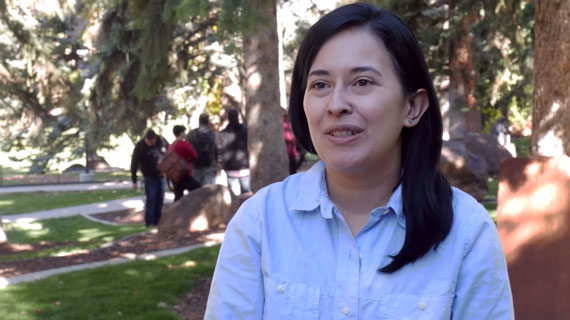7 Steps to Graduate with a Spanish Degree
Posted: December 02, 2016 | Author: Abigail Wyatt | Read Time: 2 minutes

More than 50 million people in the United States speak Spanish. Around the world, there are over 400 million Spanish speakers. As a result, no matter what kind of career you would like to pursue, most businesses, government agencies, and nonprofit organizations welcome applicants who are competent in Spanish.
Spanish majors and minors at Southern Utah University gain proficiency in reading, writing, and speaking Spanish. Students also learn about Hispanic culture through a wide variety of upper division courses, and gain knowledge and skills that can help them succeed in many different career fields.
Are you already majoring in another area? Consider a double major in Spanish. Employers and graduate schools see applicants with double majors as doubly prepared!
Are you already fluent in Spanish? If so, having a major or minor in Spanish on your transcript is proof of your skills and abilities.
Are you planning to go to graduate school, medical school, or law school? Studying Spanish will help you prepare!
Elizabeth Judd is a Spanish major from Maplewood, Minnesota. She shared why being a Spanish major is so great and gave tips about how to succeed in Spanish.
7 Steps to Graduate with a Spanish Degree from Southern Utah University
How to begin. Get on board by taking one of two tracks: take SPAN 1010, 1020, 2010, and 2020 or, if you already have experience with Spanish, you can test out of those lower division classes through a proficiency exam.
Plan your schedule with an advisor. Each class has a different amount and type of workload. Plan out your schedule with your advisor so you can spread out your classes and learn from a variety of teachers.
Use online and app resources. There are many apps and websites, like Duolingo, that can help you with language practice and retention.
Take advantage of the on-campus resources. There are tutoring labs and conversation tables where you can practice your Spanish with other Spanish speakers.
Take what interests you. Once you get through the beginning classes you can take a variety of classes about the Spanish language, culture and literature as you work on becoming bilingual.
Study abroad. Nothing is more beneficial for your language education than experiencing immersion in another culture. It will increase your love for the culture and improve your language proficiency.
Search for a Spanish-speaking job. Ask your professors about working as a Spanish tutor or grader. This will help improve your language abilities. Ask around in the community about opportunities as well. Local churches, medical offices, and businesses are often searching for translators.
This article was published more than 3 years ago and might contain outdated information or broken links. As a result, its accuracy cannot be guaranteed.
Tags: College of Humanities and Social Sciences Majors International Affairs


